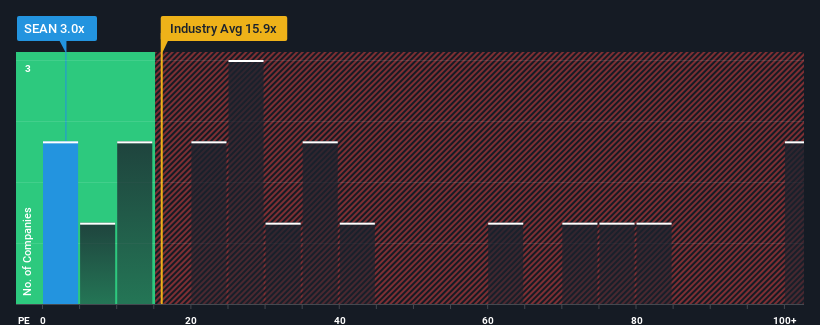- Switzerland
- /
- Real Estate
- /
- BRSE:SEAN
Market Cool On Swiss Estates AG's (BRN:SEAN) Earnings Pushing Shares 46% Lower
The Swiss Estates AG (BRN:SEAN) share price has fared very poorly over the last month, falling by a substantial 46%. To make matters worse, the recent drop has wiped out a year's worth of gains with the share price now back where it started a year ago.
Since its price has dipped substantially, Swiss Estates' price-to-earnings (or "P/E") ratio of 3x might make it look like a strong buy right now compared to the market in Switzerland, where around half of the companies have P/E ratios above 20x and even P/E's above 33x are quite common. Nonetheless, we'd need to dig a little deeper to determine if there is a rational basis for the highly reduced P/E.
While the market has experienced earnings growth lately, Swiss Estates' earnings have gone into reverse gear, which is not great. The P/E is probably low because investors think this poor earnings performance isn't going to get any better. If this is the case, then existing shareholders will probably struggle to get excited about the future direction of the share price.
Check out our latest analysis for Swiss Estates

Does Growth Match The Low P/E?
Swiss Estates' P/E ratio would be typical for a company that's expected to deliver very poor growth or even falling earnings, and importantly, perform much worse than the market.
Retrospectively, the last year delivered a frustrating 68% decrease to the company's bottom line. However, a few very strong years before that means that it was still able to grow EPS by an impressive 56% in total over the last three years. Accordingly, while they would have preferred to keep the run going, shareholders would probably welcome the medium-term rates of earnings growth.
Looking ahead now, EPS is anticipated to climb by 17% per year during the coming three years according to the two analysts following the company. With the market only predicted to deliver 9.1% per year, the company is positioned for a stronger earnings result.
In light of this, it's peculiar that Swiss Estates' P/E sits below the majority of other companies. It looks like most investors are not convinced at all that the company can achieve future growth expectations.
The Bottom Line On Swiss Estates' P/E
Shares in Swiss Estates have plummeted and its P/E is now low enough to touch the ground. Generally, our preference is to limit the use of the price-to-earnings ratio to establishing what the market thinks about the overall health of a company.
We've established that Swiss Estates currently trades on a much lower than expected P/E since its forecast growth is higher than the wider market. There could be some major unobserved threats to earnings preventing the P/E ratio from matching the positive outlook. At least price risks look to be very low, but investors seem to think future earnings could see a lot of volatility.
You need to take note of risks, for example - Swiss Estates has 6 warning signs (and 2 which can't be ignored) we think you should know about.
If these risks are making you reconsider your opinion on Swiss Estates, explore our interactive list of high quality stocks to get an idea of what else is out there.
New: Manage All Your Stock Portfolios in One Place
We've created the ultimate portfolio companion for stock investors, and it's free.
• Connect an unlimited number of Portfolios and see your total in one currency
• Be alerted to new Warning Signs or Risks via email or mobile
• Track the Fair Value of your stocks
Have feedback on this article? Concerned about the content? Get in touch with us directly. Alternatively, email editorial-team (at) simplywallst.com.
This article by Simply Wall St is general in nature. We provide commentary based on historical data and analyst forecasts only using an unbiased methodology and our articles are not intended to be financial advice. It does not constitute a recommendation to buy or sell any stock, and does not take account of your objectives, or your financial situation. We aim to bring you long-term focused analysis driven by fundamental data. Note that our analysis may not factor in the latest price-sensitive company announcements or qualitative material. Simply Wall St has no position in any stocks mentioned.
About BRSE:SEAN
Swiss Estates
Engages in investing in the real estate properties in Switzerland.
Slight risk and slightly overvalued.
Market Insights
Community Narratives


Recently Updated Narratives

TAV Havalimanlari Holding will fly high with 25.68% revenue growth


Fiducian: Compliance Clouds or Value Opportunity?


Q3 Outlook modestly optimistic
Popular Narratives


MicroVision will explode future revenue by 380.37% with a vision towards success


The company that turned a verb into a global necessity and basically runs the modern internet, digital ads, smartphones, maps, and AI.



